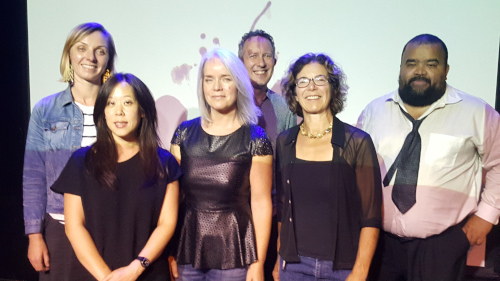SUBSCRIBE TO THE FREE NEWSLETTER
An evening of words and ideas
This past Friday and amazingly talent group of poets, a climate scientist, and a journalist–all published at Cascadia Magazine–came together to read from and discuss their work. The Evening of Words & Ideas was a fascinating and inspiring event at the gorgeous Jewelbox Theater at The Rendezvous in Seattle.
It was, like Cascadia Magazine, an eclectic mix–Martha Silano read new poems and talked about the inspirations that informed them, from a graffiti-carved madrona to a poem of Walt Whitman. Climate scientist Sarah Myhe talked about the urgency of fighting patriarchy as we tackle climate change, while poet Shin Yu Pai offered a multi-media exploration of the genesis of her poem “Ensō.” Karin Jones talked about the lessons she learned interviewing people who practice consensual non-monogamy and polyamory in the Pacific Northwest. And poet Robert Lashley read from his complex and touching new work, including “OG Bird Rescue Man,” recently published at Cascadia Magazine.
We’re so grateful to those who came to see this presentation, and to the talented group of writers who made it such a memorable evening. Thanks!
KUOW’s Speakers Forum was there recording the event, so if you couldn’t make it, you can listen to this reading in a broadcast and podcast soon–stay tuned to Cascadia Daily for more details. –Andrew Engelson
Fatal bus crash on Vancouver Island raises forest road concerns
After a bus crash on Vancouver Island killed two high school students and injured 17 over the weekend, many are asking if BC’s forest roads are safe. CBC looks at the history of safety on the gravel road to Bamfield (where the accident happened) as well as the remote road to Tahis, which many residents say is unsafe.
Seattle considers minimum pay for Uber & Lyft drivers
After California passed legislation making it harder for ride-share companies like Uber and Lyft to treat its workers as independent contractors, the Seattle mayor’s office is looking at a proposal that would set baseline earnings for drivers that would equal minimum wage plus expenses. In other labor news, workers at the health nonprofit Kaiser Permanente are planning to strike on Oct 14 in California, Oregon, and Washington–in what could be the largest union walkout in the US since 1987. More on the strike can be found at this feature in Salon.
BC ends “birth alerts” affecting high-risk newborns
The Tyee reports that British Columbia is ending the practice of “birth alerts,” which sometimes resulted in newborns being taken from “high risk” parents with addiction problems–but which critics have noted overwhelmingly affected Indigenous populations. “We are changing the way we work with and support high-risk expectant parents to keep newborns safe and families together through a collaborative, rather than an involuntary, model,” said BC’s child and family development minister.
Bering Sea ice retreat hits Seattle fishing fleet
The Seattle Times has a detailed and disturbing report about the shocking and rapid disappearance of ice pack in the Bering Sea between Russia and Alaska. Thanks to climate change, in the past two years, this ice pack has dwindled to nearly nothing. The US fishing industry (with many boats based in Seattle) gets most of its fish from the Bering Sea, and it could be at serious risk as stocks of pollock, halibut, and king crab decline.
A poetic tribute to playwright August Wilson
One of North America’s finest playwrights, the late August Wilson, called Seattle home, and Roy Ayers pays tribute in a poem online at the South Seattle Emerald:
“For the love of August, the ending of summer the beginning of fall.
Oh I remember conversation on the Ave.
Him smoking cigar and quite chatty when he had time.
When he was in the zone, just leave the man alone.”
Read the full poem online here.
“What the Birds See,” an essay by Janice Lee
Over at Heavy Feather Review, check out Portland-based writer Janice Lee’s “What the Birds See,” an essay from the future that takes a decidedly non-human look at the world. It’s complex and gorgeous: “The amphibians that inhabit this planet know the treacheries of polarizing life and death, and so in their journeys on both land and water, still remember the invigoration of the birth of civilization itself. Here, nothing is ever forgotten or forgiven. The amphibians, in their dependence and profound understanding of the environment, the cycles of the sun and the erosion of time, constantly ask the question of home, and know that the map is not the answer.” Read the full essay here.
That’s today’s assortment of news, environmental reporting, arts, culture and salamanders from across the Cascadia bioregion. Thanks for reading! –Andrew Engelson
Photo credit: readers from Cascadia Magazine’s Evening of Words & Ideas by John O’Brien

